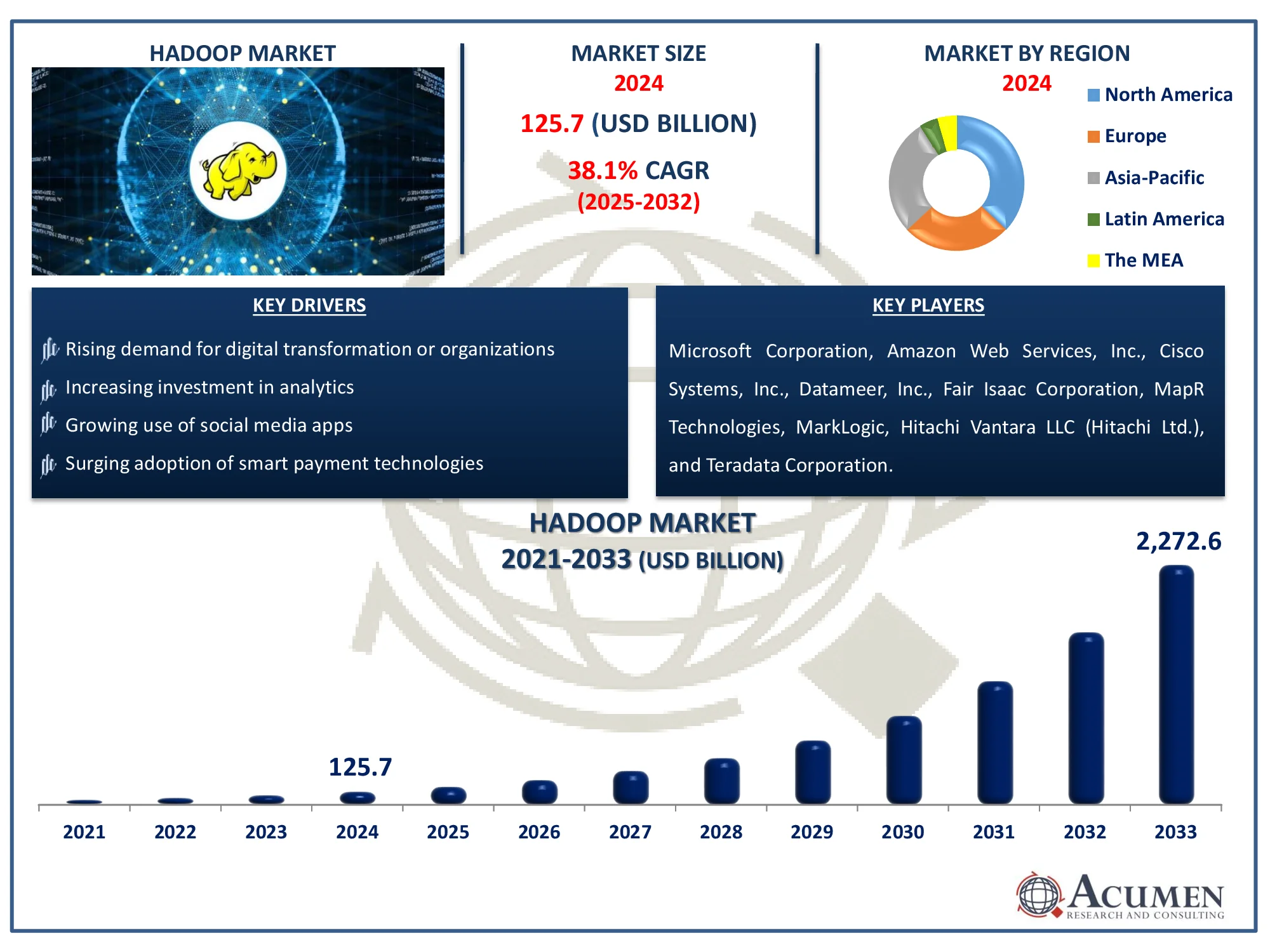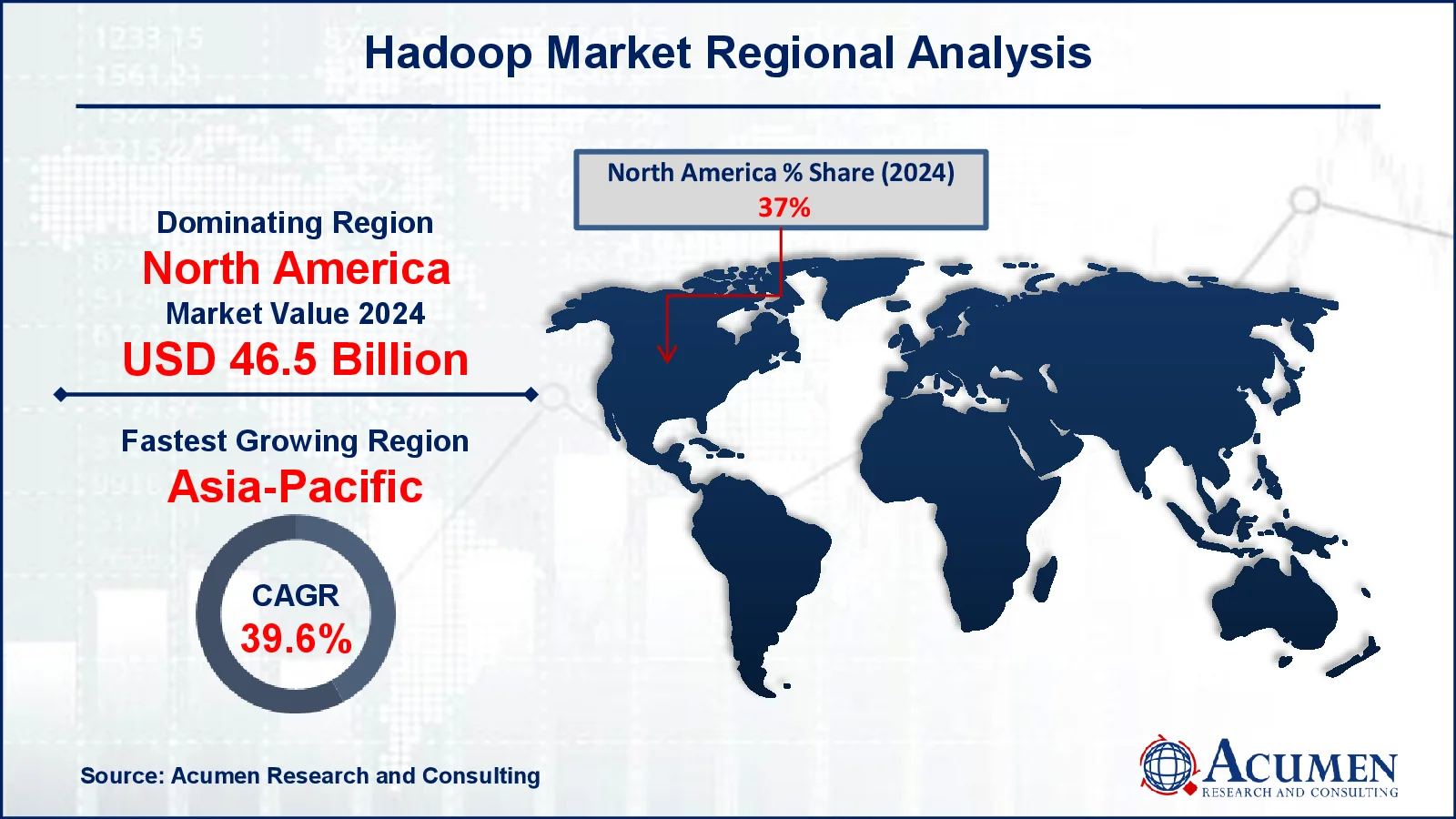August 2022
The Global Hadoop Market Size accounted for USD 125.7 Billion in 2024 and is estimated to achieve a market size of USD 2,272.6 Billion by 2033 growing at a CAGR of 38.1% from 2025 to 2033.
The Global Hadoop Market Size accounted for USD 125.7 Billion in 2024 and is estimated to achieve a market size of USD 2,272.6 Billion by 2033 growing at a CAGR of 38.1% from 2025 to 2033.

Hadoop is an open-source platform based on Java those stores and processes large amounts of data. The framework is administered by the Apache Software Foundation and released under the Apache License 2.0. Hadoop is playing a vital role in providing much-needed updates to the database world as more applications create massive amounts of data that must be processed. While application servers' computing capabilities have increased dramatically in recent years, databases have struggled due to their limited speed and capacity. This software is mostly used by data analysts to manage massive amounts of data, and its market share is growing. Hadoop is made up of three parts: Hadoop Distributed File System (HDFS), which stores data, Hadoop MapReduce, which processes data, and Yet Another Resource Negotiator (YARN), which manages resources.
|
Market |
Hadoop Market |
|
Hadoop Market Size 2024 |
USD 125.7 Billion |
|
Hadoop Market Forecast 2033 |
USD 2,272.6 Billion |
|
Hadoop Market CAGR During 2025 - 2033 |
38.1% |
|
Hadoop Market Analysis Period |
2021 - 2033 |
|
Hadoop Market Base Year |
2024 |
|
Hadoop Market Forecast Data |
2025 - 2033 |
|
Segments Covered |
By Component, By Deployment Model, By Industry Vertical, and By Geography |
|
Regional Scope |
North America, Europe, Asia Pacific, Latin America, and Middle East & Africa |
|
Key Companies Profiled |
Microsoft Corporation, Amazon Web Services, Inc., Cloudera, Inc., Cisco Systems, Inc., Datameer, Inc., Fair Isaac Corporation, MapR Technologies, MarkLogic, Hitachi Vantara LLC (Hitachi Ltd.), and Teradata Corporation. |
|
Report Coverage |
Market Trends, Drivers, Restraints, Competitive Analysis, Player Profiling, Covid-19 Analysis, Regulation Analysis |
The tremendous increase in data around the world is the key driver of the worldwide hadoop market. Every day, people around the world generate 2.5 quintillion bytes of data. The increasing number of internet users around the world contributes to this data. According to Our World in Data, many of us can't fathom our lives without the internet, but the technology is still very young. As of 2023, just 63% of the world's population was online. Because the bulk of the population was remaining at home owing to the COVID-19 epidemic, the number of internet users surged dramatically, as did the work-from-home trend. As a result, the world experienced exponential data generation throughout the pandemic.
Availability of low-cost data processing solutions is another factor that is driving up the hadoop market share. Hadoop can manage both unstructured and structured data from a data centre or relational database, allowing the end user to make more informed decisions based on massive amounts of data. Additionally, cost-effective and fast data processing is also supporting the market growth.
However, as technology evolves, so does the frequency of data intrusions. As a result, when developing analytics solutions for various enterprise applications, data privacy and security are critical. When big data is collected, it is processed in parallel. With the rise of cyber threats across multiple industries, hadoop solutions are prone to hacking, that also means sensitive organizational data could get into the wrong hands, causing severe damage.
Growing deployment of cloud-based solutions is expected to generate numerous growth opportunities for the market in the coming years. This also means that many companies are shifting their business approach towards digitization by investing heavily in cloud-based solutions. According to Cisco, 73% of cloud workloads and compute occurrences will be in public cloud data centres in the United States in 2021, up from 58% in 2019.
 Hadoop Market Segmentation
Hadoop Market SegmentationThe worldwide market for hadoop is split based on service, application, care provider, and geography.
The software segment dominates the hadoop market, driven by the growing adoption of big data analytics solutions across industries. Hadoop software frameworks, including Hadoop Distributed File System (HDFS), MapReduce, and Apache Spark, are critical for handling and analyzing large amounts of organized and unstructured data. Businesses are investing substantially in hadoop software to increase real-time data processing, make better decisions, and acquire important insights. Additionally, the increased demand for cloud-based hadoop solutions is further fueling the software segment’s dominance. As enterprises prioritize digital transformation, AI-driven analytics, and automation, the need for advanced hadoop software solutions grows, making it the market's most significant revenue generator.
As per the hadoop industry analysis, in 2024, the services sub-segment had the notable percentage share, and this is anticipated to continue in the next years. The increasing deployment of hadoop as a service is projected to drive segment growth. Hadoop services are a comprehensive data analytics framework that includes hadoop training and outsourcing, Hadoop consultancy, integration, and deployment, hadoop middleware, and hadoop support. However, the software sub-segment is likely to expand fast during the hadoop market forecast period of 2025 to 2033.
The cloud-based segment drives the hadoop market, owing to the increased preference for scalable, cost-efficient, and flexible data management solutions. Businesses are increasingly turning to cloud-based hadoop implementations to lower infrastructure costs, improve accessibility, and provide real-time analytics. Cloud platforms enable seamless interaction with AI, IoT, and edge computing, increasing adoption. Furthermore, major cloud service providers such as AWS, Microsoft Azure, and Google Cloud are constantly improving their Hadoop capabilities, making it easier for businesses to install and manage big data solutions. Demand for remote access, disaster recovery, and pay-as-you-go pricing models has also helped to the rapid expansion of cloud-based Hadoop solutions, which have now emerged as the market's dominant deployment option.
According to the hadoop market forecast, the on-premise sub-segment obtained the considerable revenue between 2025 and 2033 and is expected to gain significant traction in the near future. The increasing data privacy and security concerns among cloud-based deployment models are attributed to the largest share in the on-premise segment. However, with technological advancements and the adoption of artificial intelligence and machine learning, data security issues in cloud-based solutions will be minimized.
The IT & telecom segment dominated the industry vertical category and will continue to do so in the coming years. This is due to the fact that businesses looking to use hadoop for business purposes will prefer cloud-based hadoop solutions over dealing with the challenges associated with on-premise hadoop. However, the healthcare industry is expected to be the fastest growing segment in the hadoop market, with a significant CAGR between 2025 and 2033, driven by the growing demand for well-organized and smooth-functioning cloud-based solutions in this sector.
North America
Europe
Asia-Pacific
Latin America
The Middle East & Africa
 Hadoop Market Regional Analysis
Hadoop Market Regional AnalysisNorth America, out of all regions, generated the maximum revenue in 2024 and is expected to lead the market from 2025 to 2033. The region's largest share can be attributed to the region's massive amount of data, development in AI and big data technologies, and rising concerns about data integrity. Furthermore, increased cloud computing penetration, an advanced healthcare industry, and growing use of virtual innovative technologies are all supporting the North American hadoop market. Additionally, the region benefits from strong government support for digital transformation and the presence of leading cloud service providers such as Amazon Web Services (AWS), Microsoft Azure, and Google Cloud, which integrate Hadoop solutions into their platforms. The widespread adoption of 5G technology is also enhancing data processing capabilities, further accelerating the demand for hadoop-based analytics.
Meanwhile, the Asia-Pacific region is expected to grow rapidly in the coming years. The region's popularity for hadoop big data analytics solutions is increasing due to the rapid increase in data production from a variety of industries on a daily basis. The expanding number of software startups, together with the expansion of data centers in countries such as China, India, and Singapore, is driving the use of big data technology. Furthermore, government initiatives such as "Digital India" and "Made in China 2025" push businesses to implement advanced data analytics solutions, which drive market growth. The growing emphasis on AI-driven analytics for corporate intelligence, customer insights, and operational efficiency is also propelling the region's hadoop industry forward. Furthermore, the increasing adoption of edge computing and hybrid cloud solutions boosts data processing capabilities, hastening market expansion.
Some of the top hadoop companies offered in our report include Microsoft Corporation, Amazon Web Services, Inc., Cloudera, Inc., Cisco Systems, Inc., Datameer, Inc., Fair Isaac Corporation, MapR Technologies, MarkLogic, Hitachi Vantara LLC (Hitachi Ltd.), and Teradata Corporation.
Looking for discounts, bulk pricing, or custom solutions? Contact us today at sales@acumenresearchandconsulting.com
August 2022
April 2023
January 2025
July 2024